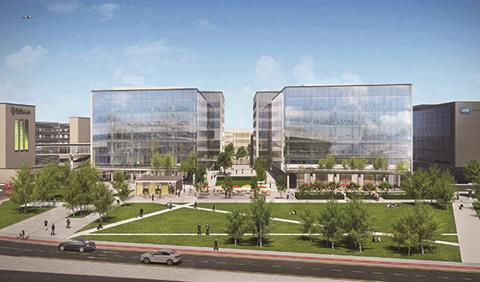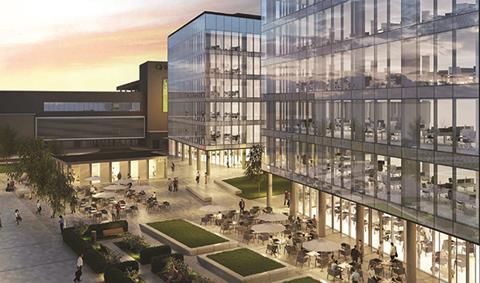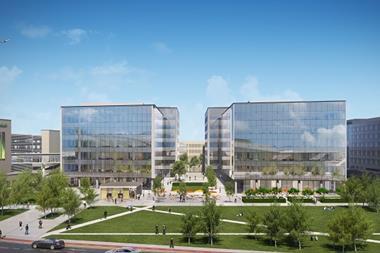Dublin Airport hopes to attract multinational companies to its major new office development.

A major new office development at Dublin Airport - just north of the city’s boundaries - is hoping to attract companies seeking easy access to Europe and beyond from their doorstep.
Following the success of One Dublin Airport Central, a redeveloped 1960s office building, which completed in April 2017 and is solely occupied by the Republic of Ireland’s Electricity Supply Board, daa (previously Dublin Airport Authority) is pushing ahead with the development of four new grade-A office buildings totalling 41,700 sq m (448,854 sq ft).
So what do the plans comprise exactly? And why is now the right time to create new commercial space at Dublin Airport?
Next-generation office destination
Daa gained planning permission in February for the four offices, which will range in size from 8,449 sq m to 11,188 sq m and will front on to 1.25 acres of landscaped gardens.
They will comprise the first phase of development on a 70-acre site, which could eventually house 300,000 sq m of commercial space.

Construction of the first two offices has already begun and is expected to complete in the fourth quarter of 2018.
John Heffernan, chief development officer at the daa, has high hopes for Dublin Airport Central, which he calls Ireland’s best-connected “next-generation” office destination.
Dublin Airport Central reflects a new asset category in office development for Dublin - John Heffernan, daa
“Dublin Airport Central reflects a new asset category in office development for Dublin and Ireland. It is neither city centre nor suburban but it incorporates the best attributes of both those categories,” he says.
“It will provide prospective tenants with a unique offering in terms of a high-quality office environment, superb onsite amenities and unrivalled national and international transport connectivity.”
The site sits at the heart of the airport campus, directly opposite Terminal 2, which is already home to 250 businesses and 19,000 employees. It is directly accessible from the M1 motorway and occupiers are expected to be attracted by its location within the airport - one of the fastest growing in Europe - with more than 4,000 flights a week to and from Europe, the US and other destinations.
Brexit relocation
The airport’s existing onsite amenities - which include a number of retail outlets, 30 restaurants and eateries and facilities including a fitness centre and a swimming pool - are another incentive.
The potential targets for daa and its joint letting agents Bannon and BNP Paribas Real Estate include companies looking to relocate from the UK as a result of Brexit.

“There are definitely opportunities to secure Brexit-related companies with a number of firms already committing to Dublin as the location of choice,” says Heffernan. “Dublin Airport Central is ideally placed to meet the extensive requirements of these companies - the amenities, housing and schools in the local area would offer an excellent quality of life for their employees.”
The amenities, housing and schools in the local area would offer an excellent quality of life for employees - John Heffernan, daa
The offices have been designed to provide accommodation suitable to act as company headquarters and Dublin Airport Central will be marketed as a place where occupiers with expansion plans can be accommodated without having to find larger premises elsewhere.
Heffernan expects “significant demand” for the first two office blocks, which are available to lease on a floor-by-floor basis or in their entirety, and says they are in discussions with a number of national and international companies.

“The successful letting of our first building [One Dublin Airport Central] has proved that office accommodation at Dublin Airport is a winning proposition for the Irish commercial property market,” says Heffernan. “There is huge potential for Dublin Airport Central to grow.”
The 70-acre site certainly offers plenty of scope for growth and if the first phase proves to be a success, there is every chance that its full potential will be realised.






























No comments yet